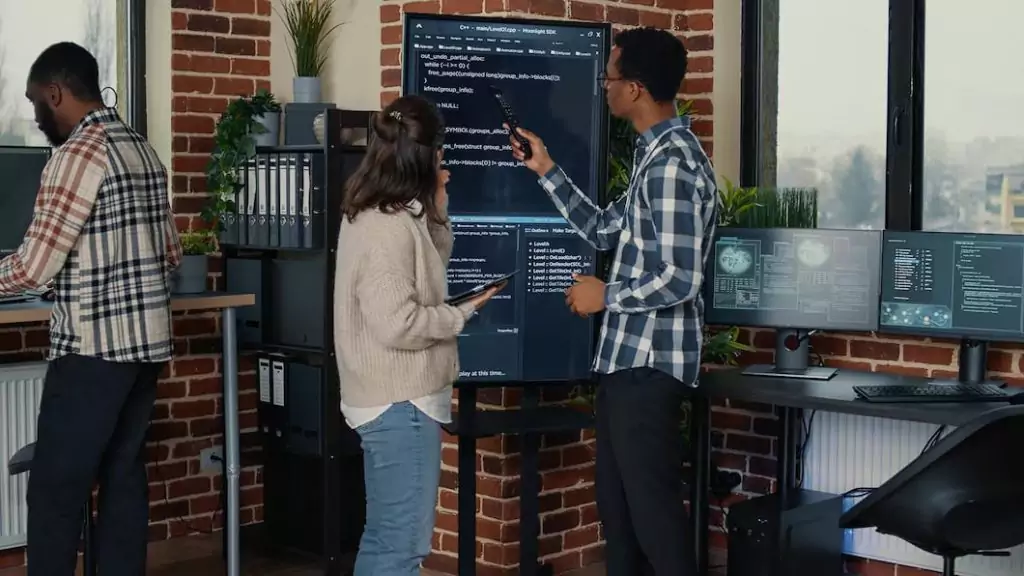AI and software engineering are increasingly converging, resulting in remarkable advancements and heightened efficiency across the field.

✅ AI Essay Writer ✅ AI Detector ✅ Plagchecker ✅ Paraphraser
✅ Summarizer ✅ Citation Generator

This growing influence has led to AI-driven software development, which automates repetitive tasks, streamlines development processes, and provides intelligent assistance to developers in various aspects of their work.
Key Takeaways:
- AI enhances software engineering by automating tasks, streamlining processes, and providing intelligent assistance in various aspects of development.
- AI-driven tools improve debugging, code review, testing, UI/UX design, and scalability, resulting in faster development and higher quality software.
- Ethical considerations are crucial as AI becomes more prevalent in software engineering, requiring developers to create responsible and unbiased AI-powered applications.
One noteworthy example of human engineers collaborating with AI is the use of natural language processing (NLP) to generate code from simple English descriptions. This innovative approach expedites and enhances software development efficiency.
AI has been instrumental in improving debugging processes. AI-driven tools like DeepCode and Kite automate debugging, rapidly detecting and fixing errors in code. Clearly, by utilizing machine learning to identify patterns and anomalies, these tools significantly reduce time and effort developers traditionally invest in debugging tasks.
The impact of AI extends to coding languages, prompting the creation of specialized, domain-specific languages designed to facilitate AI-powered application development. Languages such as TensorFlow and PyTorch are widely used for machine learning and deep learning applications. Now, developers focus on crafting cutting-edge AI solutions with tailored syntax and features.
AI has also made significant strides in code review. AI-powered tools like DeepCode and Codota assist developers in evaluating and refining their code. In particular, identifying potential issues and recommending best practices, these tools help developers write more efficient, reliable, and maintainable code. Furthermore, analyzing thousands of open-source repositories, AI-driven tools learn to spot common mistakes and provide actionable insights.
In testing, AI is transforming software engineering by automating and optimizing the process. Above all, AI-driven tools like Testim and Test.AI swiftly analyze large datasets and identify patterns. Moreover, they improve test coverage and speed up the overall testing process. These tools intelligently prioritize test scenarios and automatically generate test cases, significantly reducing manual testing time and effort.

Besides, AI plays a pivotal role in revolutionizing UI/UX design, a critical aspect of the competitive software landscape. AI-driven tools like Wix ADI (Artificial Design Intelligence) and Adobe Sensei suggest design patterns, predict user preferences, and even generate UI elements, streamlining the design process and making it more user-centric. As a result, by analyzing user behavior and preferences, these tools help designers create engaging and personalized experiences.
Scalability is a major challenge in software engineering. Interestingly, AI has been instrumental in addressing it. Indeed, AI provides insights into performance bottlenecks and identifies areas for improvement. Tools like Dynatrace and Datadog use AI to monitor and analyze application performance, helping developers create software that scales efficiently with growing demands. These insights optimize resource allocation and infrastructure management, ensuring a smooth user experience.
AI’s influence on software engineering extends to code generation as well. AI-driven tools like Tabnine, Copilot, and OpenAI Codex automatically generate code based on high-level requirements or existing code snippets. By leveraging machine learning models trained on vast code repositories, these tools provide context-aware suggestions, significantly enhancing developer productivity.
AI’s Impact on Software Engineering
| Area of Impact | Examples of AI-driven Tools | Key Benefits |
| Software Development | NLP for code generation | Streamlined development, efficient collaboration |
| Debugging | DeepCode, Kite | Faster error detection and resolution |
| Coding Languages | TensorFlow, PyTorch | Tailored syntax, domain-specific features |
| Code Review | DeepCode, Codota | Improved code quality, best practice recommendations |
| Software Testing | Testim, Test.AI | Accelerated testing, optimized test coverage |
| UI/UX Design | Wix ADI, Adobe Sensei | Efficient design, personalized user experiences |
| Scalability | Dynatrace, Datadog | Improved performance, optimized resource allocation |
| Code Generation | Tabnine, Copilot, Codex | Faster development, reduced human error |
| Ethics and Responsibility | OpenAI, Partnership on AI | Fairness, transparency, accountability |
To put it simply, As AI becomes more prevalent in software engineering. Undoubtedly, developers must be diligent in creating responsible AI-powered applications, ensuring they don’t perpetuate biases, infringe on privacy, or cause unintended harm.
Read more:
How to Become a Full Stack Developer: A Comprehensive Guide
Java and JavaScript: A Comparative Analysis of Two Distinct Programming Languages
Learning to Code: Tips and Insights for Success
Follow us on Reddit for more insights and updates.





Comments (0)
Welcome to A*Help comments!
We’re all about debate and discussion at A*Help.
We value the diverse opinions of users, so you may find points of view that you don’t agree with. And that’s cool. However, there are certain things we’re not OK with: attempts to manipulate our data in any way, for example, or the posting of discriminative, offensive, hateful, or disparaging material.